高考英语省略句强调句考点聚焦
图片预览
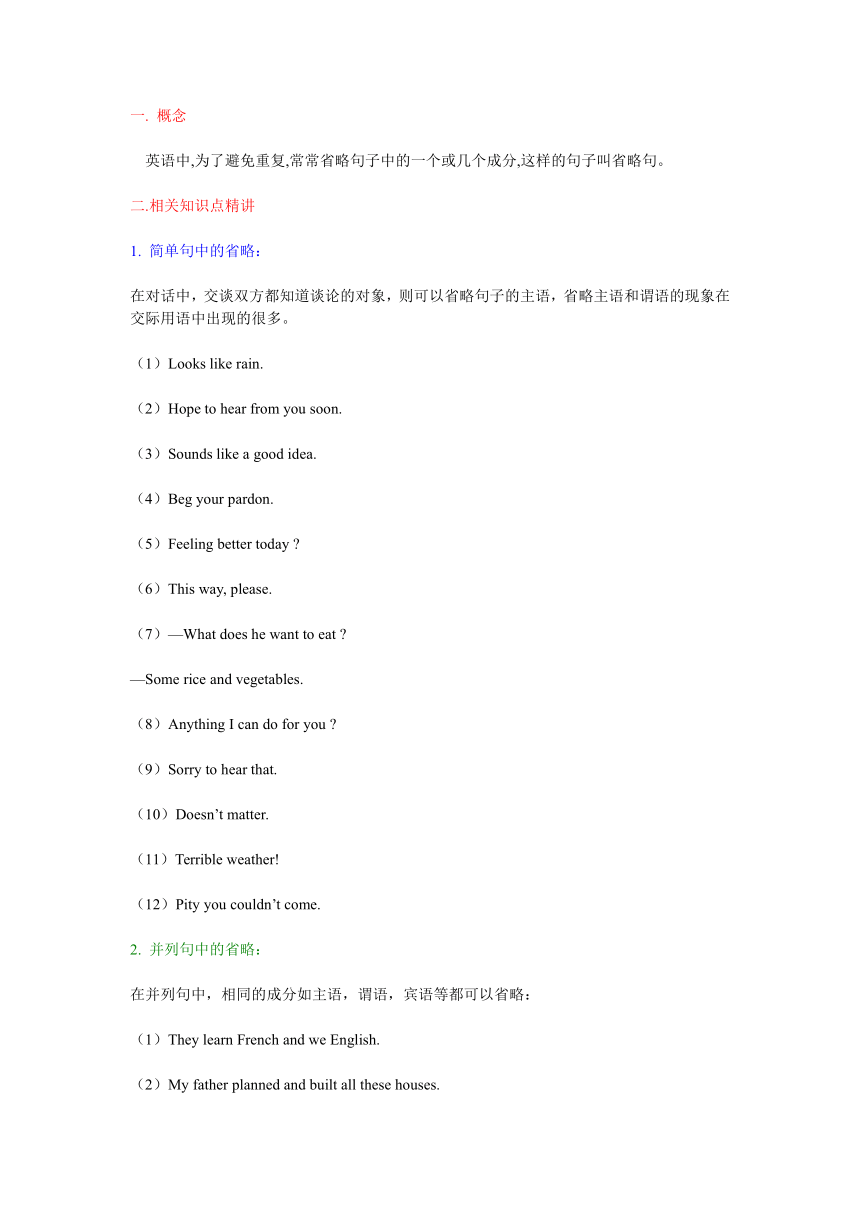
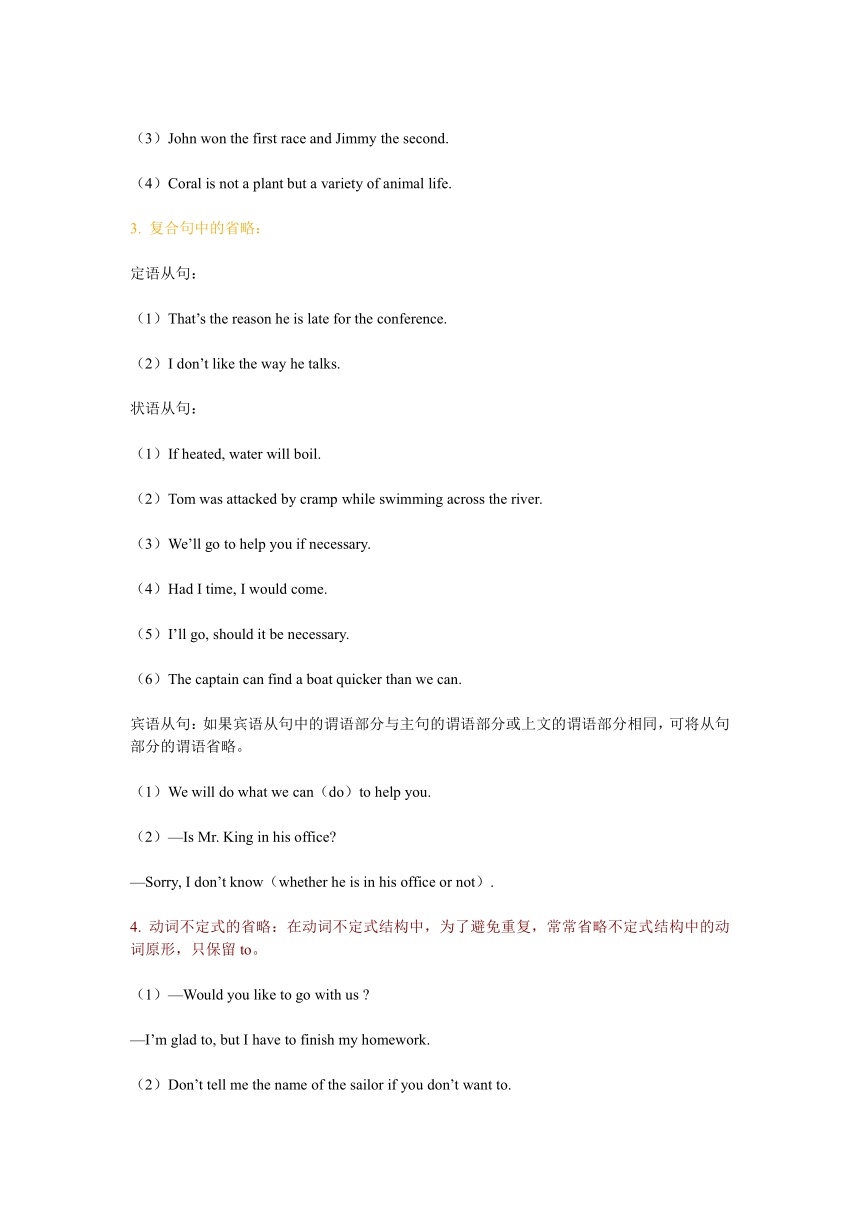
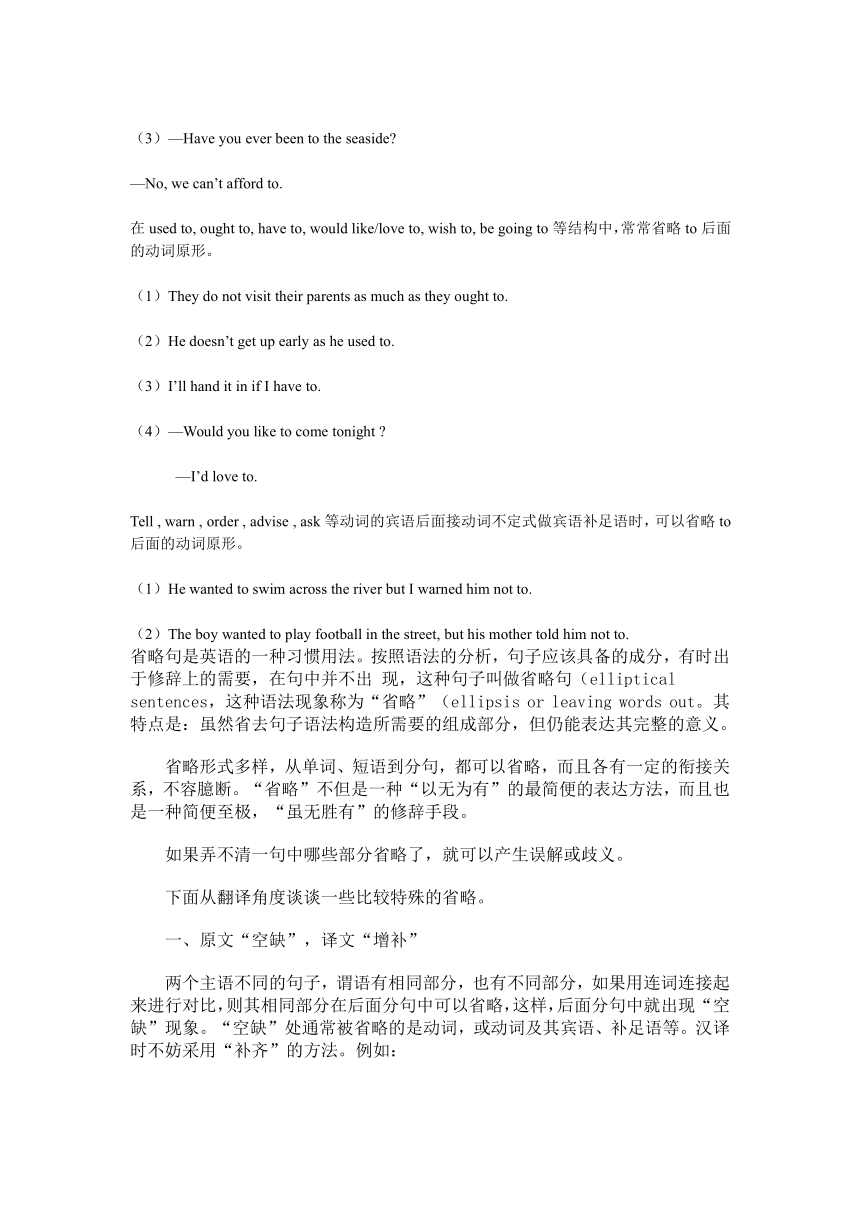
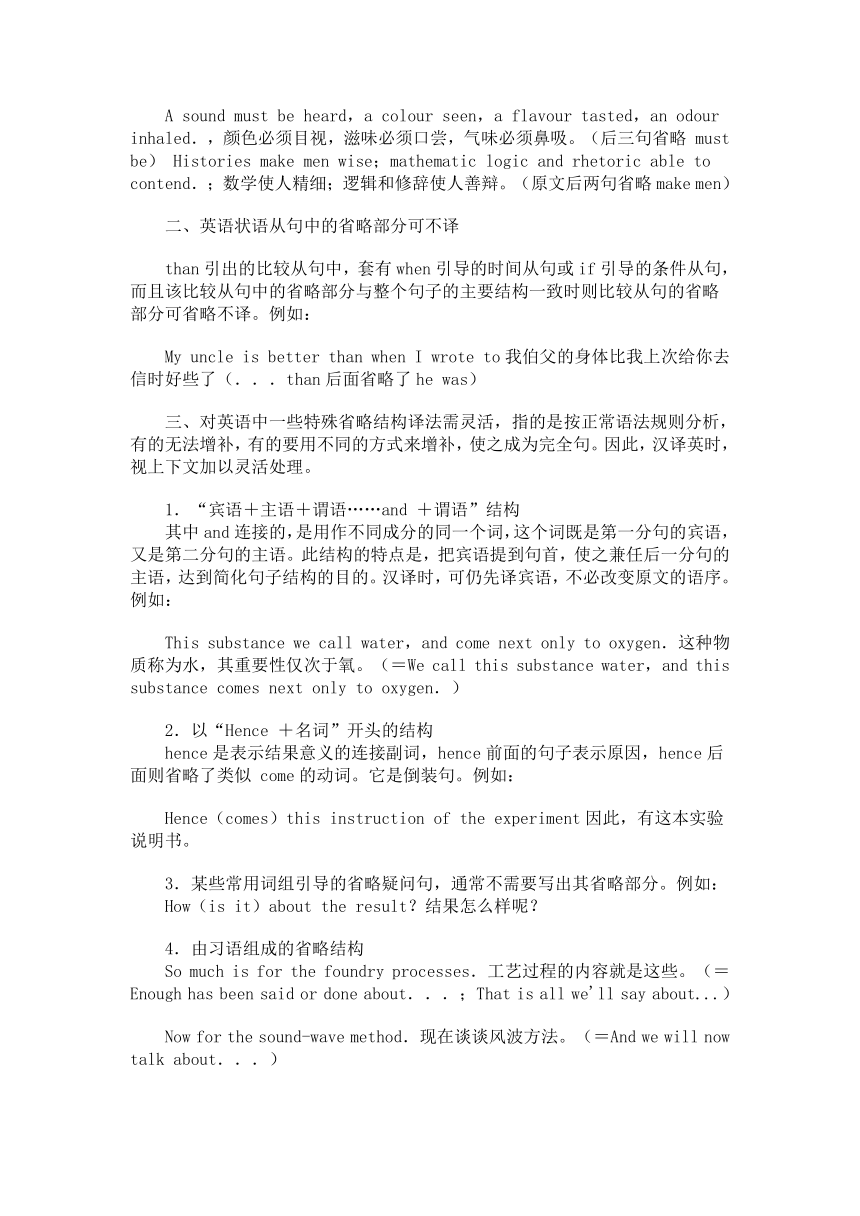
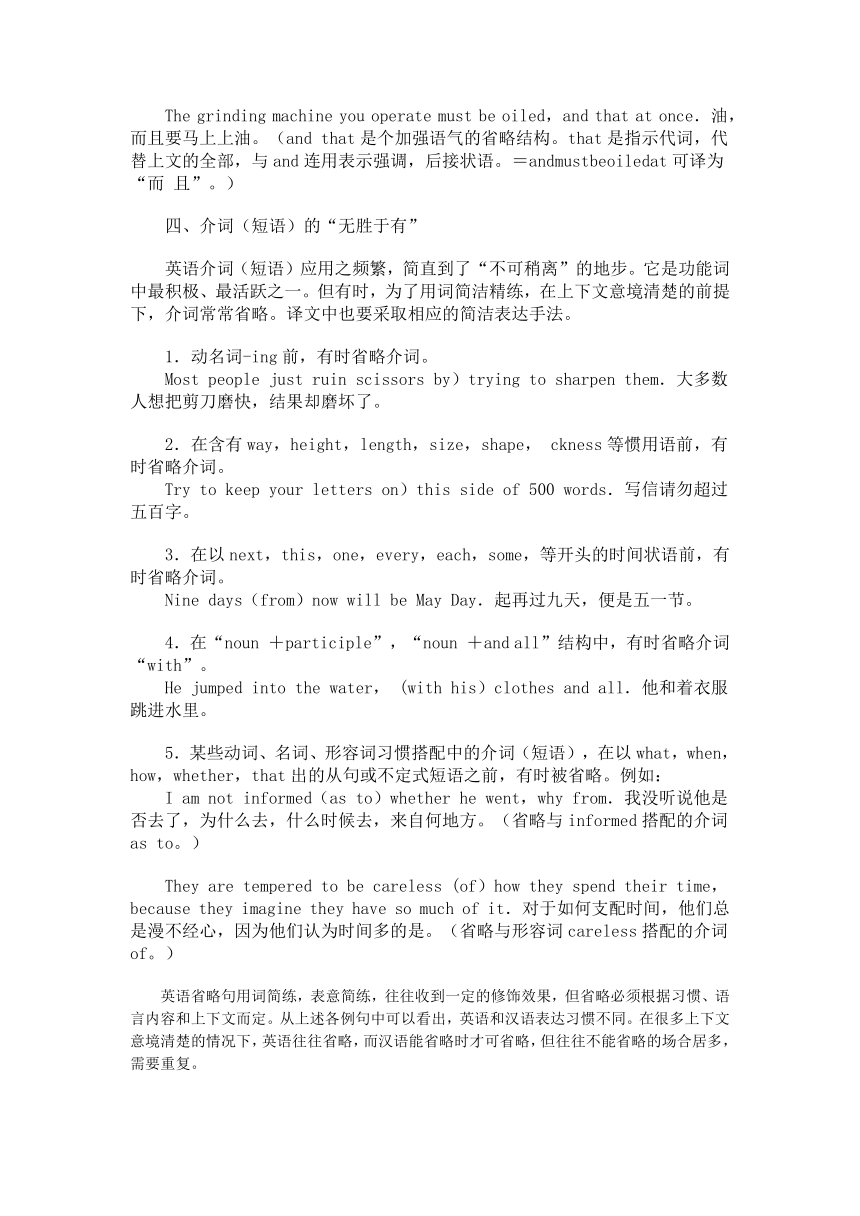
文档简介
一. 概念
英语中,为了避免重复,常常省略句子中的一个或几个成分,这样的句子叫省略句。
二.相关知识点精讲
1. 简单句中的省略:
在对话中,交谈双方都知道谈论的对象,则可以省略句子的主语,省略主语和谓语的现象在交际用语中出现的很多。
(1)Looks like rain.
(2)Hope to hear from you soon.
(3)Sounds like a good idea.
(4)Beg your pardon.
(5)Feeling better today
(6)This way, please.
(7)—What does he want to eat
—Some rice and vegetables.
(8)Anything I can do for you
(9)Sorry to hear that.
(10)Doesn’t matter.
(11)Terrible weather!
(12)Pity you couldn’t come.
2. 并列句中的省略:
在并列句中,相同的成分如主语,谓语,宾语等都可以省略:
(1)They learn French and we English.
(2)My father planned and built all these houses.
(3)John won the first race and Jimmy the second.
(4)Coral is not a plant but a variety of animal life.
3. 复合句中的省略:
定语从句:
(1)That’s the reason he is late for the conference.
(2)I don’t like the way he talks.
状语从句:
(1)If heated, water will boil.
(2)Tom was attacked by cramp while swimming across the river.
(3)We’ll go to help you if necessary.
(4)Had I time, I would come.
(5)I’ll go, should it be necessary.
(6)The captain can find a boat quicker than we can.
宾语从句:如果宾语从句中的谓语部分与主句的谓语部分或上文的谓语部分相同,可将从句部分的谓语省略。
(1)We will do what we can(do)to help you.
(2)—Is Mr. King in his office
—Sorry, I don’t know(whether he is in his office or not).
4. 动词不定式的省略:在动词不定式结构中,为了避免重复,常常省略不定式结构中的动词原形,只保留to。
(1)—Would you like to go with us
—I’m glad to, but I have to finish my homework.
(2)Don’t tell me the name of the sailor if you don’t want to.
(3)—Have you ever been to the seaside
—No, we can’t afford to.
在used to, ought to, have to, would like/love to, wish to, be going to等结构中,常常省略to后面的动词原形。
(1)They do not visit their parents as much as they ought to.
(2)He doesn’t get up early as he used to.
(3)I’ll hand it in if I have to.
(4)—Would you like to come tonight
—I’d love to.
Tell , warn , order , advise , ask等动词的宾语后面接动词不定式做宾语补足语时,可以省略to后面的动词原形。
(1)He wanted to swim across the river but I warned him not to.
(2)The boy wanted to play football in the street, but his mother told him not to.
省略句是英语的一种习惯用法。按照语法的分析,句子应该具备的成分,有时出于修辞上的需要,在句中并不出 现,这种句子叫做省略句(elliptical sentences,这种语法现象称为“省略”(ellipsis or leaving words out。其特点是:虽然省去句子语法构造所需要的组成部分,但仍能表达其完整的意义。
??省略形式多样,从单词、短语到分句,都可以省略,而且各有一定的衔接关系,不容臆断。“省略”不但是一种“以无为有”的最简便的表达方法,而且也是一种简便至极,“虽无胜有”的修辞手段。
??如果弄不清一句中哪些部分省略了,就可以产生误解或歧义。
??下面从翻译角度谈谈一些比较特殊的省略。
??一、原文“空缺”,译文“增补”
??两个主语不同的句子,谓语有相同部分,也有不同部分,如果用连词连接起来进行对比,则其相同部分在后面分句中可以省略,这样,后面分句中就出现“空缺”现象。“空缺”处通常被省略的是动词,或动词及其宾语、补足语等。汉译时不妨采用“补齐”的方法。例如:
??A sound must be heard,a colour seen,a flavour tasted,an odour inhaled.,颜色必须目视,滋味必须口尝,气味必须鼻吸。(后三句省略 must be) Histories make men wise;mathematic logic and rhetoric able to contend.;数学使人精细;逻辑和修辞使人善辩。(原文后两句省略make men)
??二、英语状语从句中的省略部分可不译
??than引出的比较从句中,套有when引导的时间从句或if引导的条件从句,而且该比较从句中的省略部分与整个句子的主要结构一致时则比较从句的省略部分可省略不译。例如:
??My uncle is better than when I wrote to我伯父的身体比我上次给你去信时好些了(...than后面省略了he was)
??三、对英语中一些特殊省略结构译法需灵活,指的是按正常语法规则分析,有的无法增补,有的要用不同的方式来增补,使之成为完全句。因此,汉译英时,视上下文加以灵活处理。
??1.“宾语+主语+谓语……and +谓语”结构
??其中and连接的,是用作不同成分的同一个词,这个词既是第一分句的宾语,又是第二分句的主语。此结构的特点是,把宾语提到句首,使之兼任后一分句的主语,达到简化句子结构的目的。汉译时,可仍先译宾语,不必改变原文的语序。例如:
??This substance we call water,and come next only to oxygen.这种物质称为水,其重要性仅次于氧。(=We call this substance water,and this substance comes next only to oxygen.)
??2.以“Hence +名词”开头的结构
??hence是表示结果意义的连接副词,hence前面的句子表示原因,hence后面则省略了类似 come的动词。它是倒装句。例如:
??Hence(comes)this instruction of the experiment因此,有这本实验说明书。
??3.某些常用词组引导的省略疑问句,通常不需要写出其省略部分。例如:
??How(is it)about the result?结果怎么样呢?
??4.由习语组成的省略结构
??So much is for the foundry processes.工艺过程的内容就是这些。(=Enough has been said or done about...;That is all we'll say about...)
??Now for the sound-wave method.现在谈谈风波方法。(=And we will now talk about...)
??The grinding machine you operate must be oiled,and that at once.油,而且要马上上油。(and that是个加强语气的省略结构。that是指示代词,代替上文的全部,与and连用表示强调,后接状语。=andmustbeoiledat可译为“而 且”。)
??四、介词(短语)的“无胜于有”
??英语介词(短语)应用之频繁,简直到了“不可稍离”的地步。它是功能词中最积极、最活跃之一。但有时,为了用词简洁精练,在上下文意境清楚的前提下,介词常常省略。译文中也要采取相应的简洁表达手法。
??1.动名词-ing前,有时省略介词。
??Most people just ruin scissors by)trying to sharpen them.大多数人想把剪刀磨快,结果却磨坏了。
??2.在含有way,height,length,size,shape, ckness等惯用语前,有时省略介词。
??Try to keep your letters on)this side of 500 words.写信请勿超过五百字。
??3.在以next,this,one,every,each,some,等开头的时间状语前,有时省略介词。
??Nine days(from)now will be May Day.起再过九天,便是五一节。
??4.在“noun +participle”,“noun +and all”结构中,有时省略介词“with”。
??He jumped into the water, (with his)clothes and all.他和着衣服跳进水里。
??5.某些动词、名词、形容词习惯搭配中的介词(短语),在以what,when,how,whether,that出的从句或不定式短语之前,有时被省略。例如:
??I am not informed(as to)whether he went,why from.我没听说他是否去了,为什么去,什么时候去,来自何地方。(省略与informed搭配的介词as to。)
??They are tempered to be careless (of)how they spend their time,because they imagine they have so much of it.对于如何支配时间,他们总是漫不经心,因为他们认为时间多的是。(省略与形容词careless搭配的介词of。)
??英语省略句用词简练,表意简练,往往收到一定的修饰效果,但省略必须根据习惯、语言内容和上下文而定。从上述各例句中可以看出,英语和汉语表达习惯不同。在很多上下文意境清楚的情况下,英语往往省略,而汉语能省略时才可省略,但往往不能省略的场合居多,需要重复。
一、 在含有状语从句的复合句中
由when,while,as, once,whenever引导的时间状语从句;或由if,unless引导的条件状语从句;由though,although,even if ,even though引导的让步状语从句;由as though,as if,as引导的方式状语从句;由because引导的原因状语从句;由wherever引导的地点状语从句,若从句的主句是it或与主句的主语相同,且 在谓语中含有be时,常省略从句的主语和be。
高考链接:
1. When first ________ to the market, these products enjoyed great success. (NMET 2004全国卷II)
A. introducing B. introduced C. introduce D. being introduced
2. It shames me to say it, but I told a lie when ________ at the meeting by my boss. (NMET 2004全国卷IV)
A. questioning B. having questioned C. questioned D. to be questioned
3. The man we followed suddenly stopped and looked as if ________ whether he was going in the right direction. (NMET 2003 安徽春)
A. seeing B. having seen C. to have seen D. to see
4. Generally speaking, ________ according to the directions, the drug has no side effect. (NMET2003上海卷)
A. when taking B. when taken C. when to take D. when to be taken
5. Unless ________ to speak, you should remain silent at the conference. (NMET 2003上海春)
A. invited B. inviting C. being invited D. having invited
6. When ________ , the museum will be open to the public next year. (NMET 2002上海春)
A. completed B. completing C. being completed D. to be completed
7. Though ________ money, his parents man-aged to send him to university. (NMET 2002上海卷)
A. lacked B. lacking of C. lacking D. lacked in
8. The research is so designed that once ________ nothing can be done to change it. (NMET 2002)
A. begins B. having begun C. beginning D. begun
二、在限定性定语从句中
作宾语的关系代词that,which,whom可以省略;在以the same... as和such... as引导的定语从句中,可以省略与主句相同的部分;the way后面的定语从句中,可以省略that,in which;在含被动语态的定语从句中,关系代词作主语时,可以省略关系代词和be,省略之后,变成过去分词短语作定语。
高考链接:
9. —You 're always e on, let's go shopping.
— ________ you ever want to do is going shopping. (NMET 2002北京、安徽、内蒙古春)
A. Anything B. Something C. All D. That
10. Is this the reason ________ at the meeting for his carelessness in his work (NMET 2002上海春)
A. he explained
B. what he explained
C. how he explained
D. why he explained
11. What surprised me was not what he said but ________ he said it. (NMET 2004湖北卷)
A. the way B. in the way that C. in the way D. the way which
12. It is easy to do the repair. ________ you need is a hammer and some nails. (NMET 2004天津卷)
A. Something B. All C. Both D. Everything
13. That's an unpleasant thing to say about your father after ________ he's done for you. (NMET 2004全国卷)
A. something B. anything C. all D. that
三、 在感官动词或短语中
在see,watch,hear,feel,observe,notice,listen to等感官动词或短语及make,have,let等使役动词之后的“宾语+不定式作宾语补足语” 结构中,不定式前省略to;有时为了避免重复,常省略与上文表达相同意思的不定式符号to之后的内容,只保留不定式符号;不定式在tell,ask, advise, wish, permit, force等动词后面作宾语补足语或主语补足语时,可以省略,但要保留不定式符号to;不定式在happy,glad,eager,ready, willing等形容词后面作状语时,可以省略,但要保留不定式符号to。
高考链接:
14. As you've never been there before, I'll have someone ________ you the way. (MET 1990上海卷)
A. to show B. show C. showing D. showed
15. —I'll be away on a business trip. Would you mind looking after my cat
—Not at all, ________ . (NMET 1995)
A. I have no time B. I'd rather not C. I'd like it D. I'd be happy to
16. —Does your brother intend to study German
—Yes, he intends ________ . (NMET 1998上海卷)
A. / B. to C. so D. that
17. —Would you like to go to the Grand Theatre with me tonight
— ________ . (NMET 1999上海卷)
A. Yes, I'd like to go to the Grand Theatre
B. I'd like to, but I have an exam tomorrow
C. No, I won't
D. That's right
18. —You should have thanked her before you left.
—I meant ________ , but when I was leaving I couldn't find her anywhere. (NMET 2000北京春招卷)
A. to do B. to C. doing D. doing to
四、 在if引导的虚拟条件句中
在if引导的虚拟语气条件句中含有had,were,should时,可以把had,were,should放在句首,省略if。
高考链接:
19. ________ it rain tomorrow, we would have to put off the visit to the Yangpu Bridge. (NMET 1994上海卷)
A. Were B. Should C. Would D. Will
20. ________ for the free tickets, I would not have gone to the films so often. (NMET 1995上海卷)
A. If it is not B. Were C. Had it not been D. If they were not
五、 在否定结构中
由nor,neither等引导的连续否定的句子也是一种省略句,这种句子在意思上与前面的句子是相同的,而且主谓用倒装。
高考链接:
21. I will know what was on his mind at the time, nor will ________ . (NMET 2004 江苏卷)
A. anyone B. anyone else C. no one D. no one else
22. Of the making of good books there is no end; neither ________ any end to their influence on man's lives. (NMET 2004 广东卷)
A. there is B. there are C. is there D. are there
23. —I would never come to this restaurant again. The food is terrible!
— ________ . (NMET 2004全国卷III)
A. Nor am I B. Neither would I C. Same with me D. So do I
Key:
1—5 BCDBA 6—10 AADCA 11—15 AACBD 16—20 BBBBC 21—23 BCB
1. 省略句的定义
省略是为了避免重复、突出新信息并使上下文紧密连接的一种语法修辞手段。省略在语言中,尤其在对话中,是一种十分普遍的现象。
2. 小品词的省略
( 1 )省略介词
He spent four hours (in) going over his lessons. 他花了四个小时复习功课。
I ' ve studied Eng1ish (for) five years. 我已学五年英语了。
( 2 )省略连词 that
I believe (that) you will succeed . 我相信你们会成功的。
It ' s a pity (that) he ' s leaving. 他要走,真遗憾。
I ' m sure (that) she will help you. 我肯定她会帮你的。
( 3 )省略关系代词
I ' ll give you all (that) I have. 我要把我所有的一切都给你。
He read the book (which) I got yesterday. 他看过我昨天买的书了。
3. 句子成分的省略
( 1 )省略主语
Beg your pardon. (我)请你原谅。( Beg 前省略了主语 I )
Take care! 当心!( Take 前省略了主语 you )
Looks as if it will rain. 看起来象要下雨。( Looks 前省略了主语 it )
( 2 )省略谓语
Who next 该谁了?( Who 后面省略了谓语 comes )
The river was deep and the ice thin. ( ice 后面省略了 was )
We ' ll do the best we can. 我们将尽力而为。( can 后面省略了动词 do )
( 3 )省略表语
Are you ready Yes, I am. 你准备好了吗? 我准备好了。( am 后面省略了 ready )
He was a lover of sports as he had been in his youth. 他还是象年轻时那样,是一位运动爱好者。( had been 后面省略了 a lover of sports )
( 4 )省略宾语
Let ' s do the dishes. I ' ll wash and you ' ll dry. 让我们洗碗吧,我来洗,你来揩干。( wash 和 dry 后面省略了宾语 dishes )
( 5 )省略定语
He spent part of the money, and the rest he saved. 那钱他花了部分,其余的他都存了起来。( the rest 后面省略了定语 of the money )
( 6 )省略状语
He was not hurt. Strange! 他没有受伤,真奇怪!( Strange 前面省略了状语 how )
难点释疑篇
1. 省略句可同时省掉句子几个成份
What exciting news! (= What exciting news it is!) 多么令人激动的消息啊!
Pity he ' s failed. (= It is a pity that he ' s failed.) 很遗憾,他失败了。
I like him more than her. (= I like him more than I like her.) 我喜欢他更甚于喜欢她。
2. 英语中有一些固定的省略结构:
a) 在以 if, when, though, as if (好像)等连词引导的从句中,如从句中的主要动词是 be ,常将主语和动词 be 省略。
If necessary, we shall send a telegram home. 如有必要,我们就往家里打电报。
Whenever possible, he will come to my help. 他一有可能就来帮助我。
While cycling, don ' t forget the traffic lights. 骑车时,不要忘记看红绿灯。
b) 由固定词组引导的疑问句:
What about having a game of chess 下盘棋怎么样?
How come they left you alone here 他们怎么会把你一人留在这里呢?
What if it ' s raining 如果天下雨怎么办?
Why not try again 为什么不再试试呢?
c) 在口语中,为了避免重复,不定式可以省去和句子前部重复的动词原形而只留下不定式符号 to 。
He may leave if he wishes to. 他可以走,如果他愿意的话。
Don ' t go till I tell you to. 等我叫你走你再走。
3. 被省略的部分一般可以在句子中补上,但有时省略结构已经定型,如果把省略部分补上,反而不合乎习惯。
He is taller than I am. 他比我高。( am 之后省略 tall ,补上不合习惯)
No parking. 禁止停车。(告示用语 = No parking is allowed here. )
有一些习惯表达很难补上所省略的部分:
Not at all. 不用谢。
No matter. 不要紧。
Thanks. 谢谢。
强 调 句
强调句是一种修辞,是人们为了表达自己的意愿或情感而使用的一种形式,主要有如下几种形式:
1.用助动词“do(does/did)+动词原形”来表示强调:
He does know the place well.他的确很熟悉这个地方。
Do write to me when you get there.你到那儿后务必给我来信。
2.用形容词 very,only,single,such, last 等修饰名词或形容词来加强语气:
That's the very textbook we used last term.这正是我们上学期用过的教材。
You are the only person here who can speak Chinese.你是这里唯一会讲汉语的人。
Not a single person has been in the shop this morning.今天上午这个商店里连一个人都没有。
How dare you buy such expensive jewels?你怎么敢买这么贵的宝石呢?
He is the last person I want to see in this world! 我最不想看他了!
3.用in the world,on earth,at all等介词短语可以表达更强的语气(常用于疑问句):
Where in the world could he be?他到底会在哪儿?
What on earth is it?它究竟是什么?
Do you know at all?你到底知不知道?
4.用感叹句来表示强烈的感情,突出说话人的情感:
How interesting a story it is!这是一个多么有趣的故事啊!
Oh,what a lie!啊,真是弥天大谎!
5. 用重复来表示强调:
Why!why!The cage is empty!啊!啊!箱子是空的。
They walked for miles and miles.他们走了好多英里。
6.用倒装句(也就是将要强调的句子或被强调的部分置于句首)来加强语气:
On the table were some flowers.桌上摆着一些花。(强调地点)
Many a time have I climbed that hill.我多次翻过那座山。
Only in this way,can we solve this problem.只有这样,我们才能解决这个问题。
7.用强调句型:“It is(was)+被强调的部分+that(who)+原句其它部分”来强调说话人的意愿:
It was on Monday night that all this happened.所有这一切发生在周一晚上。
It's me that he blamed.他怪的是我。
英语倒装句Inversion
描述:
主语和谓语是句子的核心,它们之间有两种语序:一是主语在谓语之前称为自然语序(Natural Order);二是主语在谓语之后则称为倒装语序(Inverted Order)。而倒装语序中又有全部倒装(Full Inversion)和部分倒装(Partial Inversion)两种情况。
首先,在全部倒装的句子中,要把整个谓语放在主语的前面去而构成倒装语序。
例如:
There are large numbers of students in the lecture hall.
(在There be…的句式中,There只是个引导词而不是主语,真正的主语是后面作表语的名词或者名词短语。因此,There be…的句式都是全部倒装的句子。)演讲厅里有大量的学生。
When he ran to the door, there stood a mid-aged man with a lantern in his hand .
(此句是为了"描述情节的需要",把倒装当着修辞的手段而写成了全部倒装句。句子的主语是a mid-aged man,谓语是stood 。)当他向房门跑去时,那儿正立着一位手里拿着一盏灯笼的中年男人。
另外,在部分倒装的句子中,只把谓语的一部分(如情态动词、助动词、或是系动词be)放到主语的前面去,构成倒装语序。例如:
Are you going to take part in the football match against Accounting Department on Friday afternoon (句子的谓语是are going to take part,are是句子的谓语的一部分;句子的主语是you 。所以,此句是部分倒装的句子。疑问句都是部分倒装句。)你打算去参加星期五与会计系进行的足球赛吗?
Hardly could he finish his test paper when the school bell rang .(由于语法要求的原因,本句写成了部分倒装的句子。它的自然语序应该是:When the bell rang, he could hardly finish his test paper.)他还未做完试卷,下课铃就响了。
了解了倒装语序的构成情况后,我们再来看看倒装语序在各种不同类句子中的使用情况:
A. 在疑问句中
各种疑问句一般地说都是倒装语序。例如:
Will they come to see us this weekend 这个周末他们将来看我们吗?
Are you talking about the film you saw last Monday
你们是在谈论你们上周一看的那部电影吗?
Can you speak another foreign language except English
除开英语,你还能说另一种外语吗?
Where did you buy the dictionary, in the book store nearby or in Xinhua bookstore
你在哪儿买的这本词典,是在附近的书店还是在新华书店?
She is not a student, isn't she 她不是个学生,对吗?
B. 在感叹句中
某些感叹句也用倒装语序。例如:
Isn't it a beautiful garden ! 多么美丽的花园啊!
What a beautiful garden it is ! 多么美丽的花园啊!(在这种句式中,主语在谓语之前,属于自然语序。对于主语和谓语而言,语序没有倒装。)
Have you ever seen such a naughty kid like him !
你见过那个孩子像他这么调皮!
C. 在陈述句中
陈述句在一般情况下用自然语序;但由于英语语法的某些原因,陈述句也要使用倒装语序。这些原因大致可以归纳如下:
1) 为了避免句子部分内容不必要的重复,常用"so + be动词(助动词、情态动词)+主语"或"neither / nor + be动词(助动词、情态动词)+主语"的倒装句式。其中第一个句式表示"与前面所述的肯定情况相同", 第二个句式表示"与前面所述的否定情况相同"。例如:
His brother is a college student; so is mine.
他弟弟是大学生,我弟弟也是。
His brother is not a college student; nor is mine .
他弟弟不是大学生,我弟弟也不是。
He used to have his further study abroad; so did I.
他曾去国外深造过,我也去过。
He didn't use to have his further study abroad; neither did I.
他没去国外深造过,我也没有。
One of my friends can speak three foreign languages; so can his wife.
我的一个朋友会说三门外国语,他的妻子也会。
One of my friends cannot speak three foreign languages; neither can his wife .我的一个朋友不会说三门外国语,他的妻子也不会。
They are now preparing for their final examinations; so are we .
他们正在为期末考试作准备,我们也一样。
They are not now preparing for their final examinations; nor are we .
他们没在为期末考试作准备,我们也没有。
2)具有否定意义的词或短语置于句首时(除否定词修饰主语外),句子一般要写成部分倒装句。这类词或短语常见的有:not, never, seldom, hardly, rarely, scarcely, by no means, under no circumstances, in no way, at no time, no sooner … (than), hardly … (when), not only … (but also), not until… ,等。例如:
Hardly had she sat down when she heard someone knocking at the door .
她还没来得及坐下来,就听见有人敲门。
Not until twelve o'clock did he go to bed last night .
他昨晚直到十二点钟才睡觉。
Never have my sisters been to Hong Kong before .
我的妹妹们以前从未去过香港。
No sooner had I returned home from New Zealand than I bought a house and went to live there.我从新西兰一回国,就买了一栋房子并在那儿住下了。
So far as I know, seldom does Mary come back to see her mother.
就我所知,玛利几乎很难回来看她妈妈。
Scarcely a drop of rain fell here last fall . (否定词修饰主语时,句子不用倒装。) 去年秋天,这儿几乎没下一滴雨。
3)当so, often, only等表示程度、频率的副词放在句首时,句子一般要倒装。例如:
Only in this way can you come up with a solution to the problem.
只有这样,你才有可能想出解决这个问题的办法。
So serious was the situation that everybody faced a test.
形势如此地严峻,每个人都面临着一场考验。
So hard did he overwork that he fell ill at last. 他太操劳过度以致最后病倒了。
4)当there, here, then, now等副词在句首,且谓语是come, go, be等动词时,句子一般要全部倒装。其意义在于引起他人的注意。如果这类句子的主语是代词,则不用写成倒装句。例如:
Now, here goes the story.这个故事是这样的。
Look, there comes the taxi.瞧,出租车过来了。
Then came another question.然后又一个问题提出来了。
Then followed the four-year War of Liberation.接下来是四年的解放战争。
5) 当out, in, away, up, bang等表示方位或拟声词放在句首时,句子一般要全部倒装。这类子比自然语序的句子更为生动、形象。但如果这类句子的主语是代词,则不用写成倒装句。例如:
Bang goes my ace.我砰地一下打出了"A"。(扑克牌中的点数)
Away flew the bird.那鸟飞走了。
Suddenly, in came a man with a mask on his face.
突然进来一个蒙着面具的人。
6) 其他情况还有:省略了if的虚拟条件句、某些表示祝愿的句子、以及某些让步状语从句,等等也要用倒装句式。例如:(省略了if的虚拟条件句)
Had they not helped us, we could not have done it so successfully.
如果没有他们的帮助,我们不可能把那件事办的如此成功。
Should he come, say "Nobody in" to him.
万一他来了,对他说:"公司没人。"(某些表示祝愿的句子)
May our friendship last forever.愿我们的友谊常存!
May your company become prosperous.祝贵公司生意兴隆!(某些让步状语从句)
Try as I might, I couldn't lift the stone.无论我使多大的劲,我也无法搬起那块石头。
They said they would follow the Party's lead come what might.
他们说无论发生什么情况,他们都会跟党走的。
7) 由于修辞或是平衡句子的原因也可以用倒装句;也可以不用。这不是一条必须的规定。
Next to this one is another grand hotel which is beautifully decorated .
这家饭店隔壁还有一家装修华丽的大饭店。
On either side of the great avenue stood many block buildings.
这条大街的两侧都耸立着许多综合楼。(这类句子也可以不用倒装句。)
"I'm leaving for Beijing tomorrow," said Tom to his mother (OR: Tom said to his mother) .汤姆对他妈妈说:"我明天动身去北京。"
Many block buildings stood on either side of the great avenue.
许多综合楼耸立在这条大街的两侧。
Another grand hotel, which is beautifully decorated, is next to this one .
这家饭店隔壁还有一家大饭店,那家饭店装修十分华丽。
英语中,为了避免重复,常常省略句子中的一个或几个成分,这样的句子叫省略句。
二.相关知识点精讲
1. 简单句中的省略:
在对话中,交谈双方都知道谈论的对象,则可以省略句子的主语,省略主语和谓语的现象在交际用语中出现的很多。
(1)Looks like rain.
(2)Hope to hear from you soon.
(3)Sounds like a good idea.
(4)Beg your pardon.
(5)Feeling better today
(6)This way, please.
(7)—What does he want to eat
—Some rice and vegetables.
(8)Anything I can do for you
(9)Sorry to hear that.
(10)Doesn’t matter.
(11)Terrible weather!
(12)Pity you couldn’t come.
2. 并列句中的省略:
在并列句中,相同的成分如主语,谓语,宾语等都可以省略:
(1)They learn French and we English.
(2)My father planned and built all these houses.
(3)John won the first race and Jimmy the second.
(4)Coral is not a plant but a variety of animal life.
3. 复合句中的省略:
定语从句:
(1)That’s the reason he is late for the conference.
(2)I don’t like the way he talks.
状语从句:
(1)If heated, water will boil.
(2)Tom was attacked by cramp while swimming across the river.
(3)We’ll go to help you if necessary.
(4)Had I time, I would come.
(5)I’ll go, should it be necessary.
(6)The captain can find a boat quicker than we can.
宾语从句:如果宾语从句中的谓语部分与主句的谓语部分或上文的谓语部分相同,可将从句部分的谓语省略。
(1)We will do what we can(do)to help you.
(2)—Is Mr. King in his office
—Sorry, I don’t know(whether he is in his office or not).
4. 动词不定式的省略:在动词不定式结构中,为了避免重复,常常省略不定式结构中的动词原形,只保留to。
(1)—Would you like to go with us
—I’m glad to, but I have to finish my homework.
(2)Don’t tell me the name of the sailor if you don’t want to.
(3)—Have you ever been to the seaside
—No, we can’t afford to.
在used to, ought to, have to, would like/love to, wish to, be going to等结构中,常常省略to后面的动词原形。
(1)They do not visit their parents as much as they ought to.
(2)He doesn’t get up early as he used to.
(3)I’ll hand it in if I have to.
(4)—Would you like to come tonight
—I’d love to.
Tell , warn , order , advise , ask等动词的宾语后面接动词不定式做宾语补足语时,可以省略to后面的动词原形。
(1)He wanted to swim across the river but I warned him not to.
(2)The boy wanted to play football in the street, but his mother told him not to.
省略句是英语的一种习惯用法。按照语法的分析,句子应该具备的成分,有时出于修辞上的需要,在句中并不出 现,这种句子叫做省略句(elliptical sentences,这种语法现象称为“省略”(ellipsis or leaving words out。其特点是:虽然省去句子语法构造所需要的组成部分,但仍能表达其完整的意义。
??省略形式多样,从单词、短语到分句,都可以省略,而且各有一定的衔接关系,不容臆断。“省略”不但是一种“以无为有”的最简便的表达方法,而且也是一种简便至极,“虽无胜有”的修辞手段。
??如果弄不清一句中哪些部分省略了,就可以产生误解或歧义。
??下面从翻译角度谈谈一些比较特殊的省略。
??一、原文“空缺”,译文“增补”
??两个主语不同的句子,谓语有相同部分,也有不同部分,如果用连词连接起来进行对比,则其相同部分在后面分句中可以省略,这样,后面分句中就出现“空缺”现象。“空缺”处通常被省略的是动词,或动词及其宾语、补足语等。汉译时不妨采用“补齐”的方法。例如:
??A sound must be heard,a colour seen,a flavour tasted,an odour inhaled.,颜色必须目视,滋味必须口尝,气味必须鼻吸。(后三句省略 must be) Histories make men wise;mathematic logic and rhetoric able to contend.;数学使人精细;逻辑和修辞使人善辩。(原文后两句省略make men)
??二、英语状语从句中的省略部分可不译
??than引出的比较从句中,套有when引导的时间从句或if引导的条件从句,而且该比较从句中的省略部分与整个句子的主要结构一致时则比较从句的省略部分可省略不译。例如:
??My uncle is better than when I wrote to我伯父的身体比我上次给你去信时好些了(...than后面省略了he was)
??三、对英语中一些特殊省略结构译法需灵活,指的是按正常语法规则分析,有的无法增补,有的要用不同的方式来增补,使之成为完全句。因此,汉译英时,视上下文加以灵活处理。
??1.“宾语+主语+谓语……and +谓语”结构
??其中and连接的,是用作不同成分的同一个词,这个词既是第一分句的宾语,又是第二分句的主语。此结构的特点是,把宾语提到句首,使之兼任后一分句的主语,达到简化句子结构的目的。汉译时,可仍先译宾语,不必改变原文的语序。例如:
??This substance we call water,and come next only to oxygen.这种物质称为水,其重要性仅次于氧。(=We call this substance water,and this substance comes next only to oxygen.)
??2.以“Hence +名词”开头的结构
??hence是表示结果意义的连接副词,hence前面的句子表示原因,hence后面则省略了类似 come的动词。它是倒装句。例如:
??Hence(comes)this instruction of the experiment因此,有这本实验说明书。
??3.某些常用词组引导的省略疑问句,通常不需要写出其省略部分。例如:
??How(is it)about the result?结果怎么样呢?
??4.由习语组成的省略结构
??So much is for the foundry processes.工艺过程的内容就是这些。(=Enough has been said or done about...;That is all we'll say about...)
??Now for the sound-wave method.现在谈谈风波方法。(=And we will now talk about...)
??The grinding machine you operate must be oiled,and that at once.油,而且要马上上油。(and that是个加强语气的省略结构。that是指示代词,代替上文的全部,与and连用表示强调,后接状语。=andmustbeoiledat可译为“而 且”。)
??四、介词(短语)的“无胜于有”
??英语介词(短语)应用之频繁,简直到了“不可稍离”的地步。它是功能词中最积极、最活跃之一。但有时,为了用词简洁精练,在上下文意境清楚的前提下,介词常常省略。译文中也要采取相应的简洁表达手法。
??1.动名词-ing前,有时省略介词。
??Most people just ruin scissors by)trying to sharpen them.大多数人想把剪刀磨快,结果却磨坏了。
??2.在含有way,height,length,size,shape, ckness等惯用语前,有时省略介词。
??Try to keep your letters on)this side of 500 words.写信请勿超过五百字。
??3.在以next,this,one,every,each,some,等开头的时间状语前,有时省略介词。
??Nine days(from)now will be May Day.起再过九天,便是五一节。
??4.在“noun +participle”,“noun +and all”结构中,有时省略介词“with”。
??He jumped into the water, (with his)clothes and all.他和着衣服跳进水里。
??5.某些动词、名词、形容词习惯搭配中的介词(短语),在以what,when,how,whether,that出的从句或不定式短语之前,有时被省略。例如:
??I am not informed(as to)whether he went,why from.我没听说他是否去了,为什么去,什么时候去,来自何地方。(省略与informed搭配的介词as to。)
??They are tempered to be careless (of)how they spend their time,because they imagine they have so much of it.对于如何支配时间,他们总是漫不经心,因为他们认为时间多的是。(省略与形容词careless搭配的介词of。)
??英语省略句用词简练,表意简练,往往收到一定的修饰效果,但省略必须根据习惯、语言内容和上下文而定。从上述各例句中可以看出,英语和汉语表达习惯不同。在很多上下文意境清楚的情况下,英语往往省略,而汉语能省略时才可省略,但往往不能省略的场合居多,需要重复。
一、 在含有状语从句的复合句中
由when,while,as, once,whenever引导的时间状语从句;或由if,unless引导的条件状语从句;由though,although,even if ,even though引导的让步状语从句;由as though,as if,as引导的方式状语从句;由because引导的原因状语从句;由wherever引导的地点状语从句,若从句的主句是it或与主句的主语相同,且 在谓语中含有be时,常省略从句的主语和be。
高考链接:
1. When first ________ to the market, these products enjoyed great success. (NMET 2004全国卷II)
A. introducing B. introduced C. introduce D. being introduced
2. It shames me to say it, but I told a lie when ________ at the meeting by my boss. (NMET 2004全国卷IV)
A. questioning B. having questioned C. questioned D. to be questioned
3. The man we followed suddenly stopped and looked as if ________ whether he was going in the right direction. (NMET 2003 安徽春)
A. seeing B. having seen C. to have seen D. to see
4. Generally speaking, ________ according to the directions, the drug has no side effect. (NMET2003上海卷)
A. when taking B. when taken C. when to take D. when to be taken
5. Unless ________ to speak, you should remain silent at the conference. (NMET 2003上海春)
A. invited B. inviting C. being invited D. having invited
6. When ________ , the museum will be open to the public next year. (NMET 2002上海春)
A. completed B. completing C. being completed D. to be completed
7. Though ________ money, his parents man-aged to send him to university. (NMET 2002上海卷)
A. lacked B. lacking of C. lacking D. lacked in
8. The research is so designed that once ________ nothing can be done to change it. (NMET 2002)
A. begins B. having begun C. beginning D. begun
二、在限定性定语从句中
作宾语的关系代词that,which,whom可以省略;在以the same... as和such... as引导的定语从句中,可以省略与主句相同的部分;the way后面的定语从句中,可以省略that,in which;在含被动语态的定语从句中,关系代词作主语时,可以省略关系代词和be,省略之后,变成过去分词短语作定语。
高考链接:
9. —You 're always e on, let's go shopping.
— ________ you ever want to do is going shopping. (NMET 2002北京、安徽、内蒙古春)
A. Anything B. Something C. All D. That
10. Is this the reason ________ at the meeting for his carelessness in his work (NMET 2002上海春)
A. he explained
B. what he explained
C. how he explained
D. why he explained
11. What surprised me was not what he said but ________ he said it. (NMET 2004湖北卷)
A. the way B. in the way that C. in the way D. the way which
12. It is easy to do the repair. ________ you need is a hammer and some nails. (NMET 2004天津卷)
A. Something B. All C. Both D. Everything
13. That's an unpleasant thing to say about your father after ________ he's done for you. (NMET 2004全国卷)
A. something B. anything C. all D. that
三、 在感官动词或短语中
在see,watch,hear,feel,observe,notice,listen to等感官动词或短语及make,have,let等使役动词之后的“宾语+不定式作宾语补足语” 结构中,不定式前省略to;有时为了避免重复,常省略与上文表达相同意思的不定式符号to之后的内容,只保留不定式符号;不定式在tell,ask, advise, wish, permit, force等动词后面作宾语补足语或主语补足语时,可以省略,但要保留不定式符号to;不定式在happy,glad,eager,ready, willing等形容词后面作状语时,可以省略,但要保留不定式符号to。
高考链接:
14. As you've never been there before, I'll have someone ________ you the way. (MET 1990上海卷)
A. to show B. show C. showing D. showed
15. —I'll be away on a business trip. Would you mind looking after my cat
—Not at all, ________ . (NMET 1995)
A. I have no time B. I'd rather not C. I'd like it D. I'd be happy to
16. —Does your brother intend to study German
—Yes, he intends ________ . (NMET 1998上海卷)
A. / B. to C. so D. that
17. —Would you like to go to the Grand Theatre with me tonight
— ________ . (NMET 1999上海卷)
A. Yes, I'd like to go to the Grand Theatre
B. I'd like to, but I have an exam tomorrow
C. No, I won't
D. That's right
18. —You should have thanked her before you left.
—I meant ________ , but when I was leaving I couldn't find her anywhere. (NMET 2000北京春招卷)
A. to do B. to C. doing D. doing to
四、 在if引导的虚拟条件句中
在if引导的虚拟语气条件句中含有had,were,should时,可以把had,were,should放在句首,省略if。
高考链接:
19. ________ it rain tomorrow, we would have to put off the visit to the Yangpu Bridge. (NMET 1994上海卷)
A. Were B. Should C. Would D. Will
20. ________ for the free tickets, I would not have gone to the films so often. (NMET 1995上海卷)
A. If it is not B. Were C. Had it not been D. If they were not
五、 在否定结构中
由nor,neither等引导的连续否定的句子也是一种省略句,这种句子在意思上与前面的句子是相同的,而且主谓用倒装。
高考链接:
21. I will know what was on his mind at the time, nor will ________ . (NMET 2004 江苏卷)
A. anyone B. anyone else C. no one D. no one else
22. Of the making of good books there is no end; neither ________ any end to their influence on man's lives. (NMET 2004 广东卷)
A. there is B. there are C. is there D. are there
23. —I would never come to this restaurant again. The food is terrible!
— ________ . (NMET 2004全国卷III)
A. Nor am I B. Neither would I C. Same with me D. So do I
Key:
1—5 BCDBA 6—10 AADCA 11—15 AACBD 16—20 BBBBC 21—23 BCB
1. 省略句的定义
省略是为了避免重复、突出新信息并使上下文紧密连接的一种语法修辞手段。省略在语言中,尤其在对话中,是一种十分普遍的现象。
2. 小品词的省略
( 1 )省略介词
He spent four hours (in) going over his lessons. 他花了四个小时复习功课。
I ' ve studied Eng1ish (for) five years. 我已学五年英语了。
( 2 )省略连词 that
I believe (that) you will succeed . 我相信你们会成功的。
It ' s a pity (that) he ' s leaving. 他要走,真遗憾。
I ' m sure (that) she will help you. 我肯定她会帮你的。
( 3 )省略关系代词
I ' ll give you all (that) I have. 我要把我所有的一切都给你。
He read the book (which) I got yesterday. 他看过我昨天买的书了。
3. 句子成分的省略
( 1 )省略主语
Beg your pardon. (我)请你原谅。( Beg 前省略了主语 I )
Take care! 当心!( Take 前省略了主语 you )
Looks as if it will rain. 看起来象要下雨。( Looks 前省略了主语 it )
( 2 )省略谓语
Who next 该谁了?( Who 后面省略了谓语 comes )
The river was deep and the ice thin. ( ice 后面省略了 was )
We ' ll do the best we can. 我们将尽力而为。( can 后面省略了动词 do )
( 3 )省略表语
Are you ready Yes, I am. 你准备好了吗? 我准备好了。( am 后面省略了 ready )
He was a lover of sports as he had been in his youth. 他还是象年轻时那样,是一位运动爱好者。( had been 后面省略了 a lover of sports )
( 4 )省略宾语
Let ' s do the dishes. I ' ll wash and you ' ll dry. 让我们洗碗吧,我来洗,你来揩干。( wash 和 dry 后面省略了宾语 dishes )
( 5 )省略定语
He spent part of the money, and the rest he saved. 那钱他花了部分,其余的他都存了起来。( the rest 后面省略了定语 of the money )
( 6 )省略状语
He was not hurt. Strange! 他没有受伤,真奇怪!( Strange 前面省略了状语 how )
难点释疑篇
1. 省略句可同时省掉句子几个成份
What exciting news! (= What exciting news it is!) 多么令人激动的消息啊!
Pity he ' s failed. (= It is a pity that he ' s failed.) 很遗憾,他失败了。
I like him more than her. (= I like him more than I like her.) 我喜欢他更甚于喜欢她。
2. 英语中有一些固定的省略结构:
a) 在以 if, when, though, as if (好像)等连词引导的从句中,如从句中的主要动词是 be ,常将主语和动词 be 省略。
If necessary, we shall send a telegram home. 如有必要,我们就往家里打电报。
Whenever possible, he will come to my help. 他一有可能就来帮助我。
While cycling, don ' t forget the traffic lights. 骑车时,不要忘记看红绿灯。
b) 由固定词组引导的疑问句:
What about having a game of chess 下盘棋怎么样?
How come they left you alone here 他们怎么会把你一人留在这里呢?
What if it ' s raining 如果天下雨怎么办?
Why not try again 为什么不再试试呢?
c) 在口语中,为了避免重复,不定式可以省去和句子前部重复的动词原形而只留下不定式符号 to 。
He may leave if he wishes to. 他可以走,如果他愿意的话。
Don ' t go till I tell you to. 等我叫你走你再走。
3. 被省略的部分一般可以在句子中补上,但有时省略结构已经定型,如果把省略部分补上,反而不合乎习惯。
He is taller than I am. 他比我高。( am 之后省略 tall ,补上不合习惯)
No parking. 禁止停车。(告示用语 = No parking is allowed here. )
有一些习惯表达很难补上所省略的部分:
Not at all. 不用谢。
No matter. 不要紧。
Thanks. 谢谢。
强 调 句
强调句是一种修辞,是人们为了表达自己的意愿或情感而使用的一种形式,主要有如下几种形式:
1.用助动词“do(does/did)+动词原形”来表示强调:
He does know the place well.他的确很熟悉这个地方。
Do write to me when you get there.你到那儿后务必给我来信。
2.用形容词 very,only,single,such, last 等修饰名词或形容词来加强语气:
That's the very textbook we used last term.这正是我们上学期用过的教材。
You are the only person here who can speak Chinese.你是这里唯一会讲汉语的人。
Not a single person has been in the shop this morning.今天上午这个商店里连一个人都没有。
How dare you buy such expensive jewels?你怎么敢买这么贵的宝石呢?
He is the last person I want to see in this world! 我最不想看他了!
3.用in the world,on earth,at all等介词短语可以表达更强的语气(常用于疑问句):
Where in the world could he be?他到底会在哪儿?
What on earth is it?它究竟是什么?
Do you know at all?你到底知不知道?
4.用感叹句来表示强烈的感情,突出说话人的情感:
How interesting a story it is!这是一个多么有趣的故事啊!
Oh,what a lie!啊,真是弥天大谎!
5. 用重复来表示强调:
Why!why!The cage is empty!啊!啊!箱子是空的。
They walked for miles and miles.他们走了好多英里。
6.用倒装句(也就是将要强调的句子或被强调的部分置于句首)来加强语气:
On the table were some flowers.桌上摆着一些花。(强调地点)
Many a time have I climbed that hill.我多次翻过那座山。
Only in this way,can we solve this problem.只有这样,我们才能解决这个问题。
7.用强调句型:“It is(was)+被强调的部分+that(who)+原句其它部分”来强调说话人的意愿:
It was on Monday night that all this happened.所有这一切发生在周一晚上。
It's me that he blamed.他怪的是我。
英语倒装句Inversion
描述:
主语和谓语是句子的核心,它们之间有两种语序:一是主语在谓语之前称为自然语序(Natural Order);二是主语在谓语之后则称为倒装语序(Inverted Order)。而倒装语序中又有全部倒装(Full Inversion)和部分倒装(Partial Inversion)两种情况。
首先,在全部倒装的句子中,要把整个谓语放在主语的前面去而构成倒装语序。
例如:
There are large numbers of students in the lecture hall.
(在There be…的句式中,There只是个引导词而不是主语,真正的主语是后面作表语的名词或者名词短语。因此,There be…的句式都是全部倒装的句子。)演讲厅里有大量的学生。
When he ran to the door, there stood a mid-aged man with a lantern in his hand .
(此句是为了"描述情节的需要",把倒装当着修辞的手段而写成了全部倒装句。句子的主语是a mid-aged man,谓语是stood 。)当他向房门跑去时,那儿正立着一位手里拿着一盏灯笼的中年男人。
另外,在部分倒装的句子中,只把谓语的一部分(如情态动词、助动词、或是系动词be)放到主语的前面去,构成倒装语序。例如:
Are you going to take part in the football match against Accounting Department on Friday afternoon (句子的谓语是are going to take part,are是句子的谓语的一部分;句子的主语是you 。所以,此句是部分倒装的句子。疑问句都是部分倒装句。)你打算去参加星期五与会计系进行的足球赛吗?
Hardly could he finish his test paper when the school bell rang .(由于语法要求的原因,本句写成了部分倒装的句子。它的自然语序应该是:When the bell rang, he could hardly finish his test paper.)他还未做完试卷,下课铃就响了。
了解了倒装语序的构成情况后,我们再来看看倒装语序在各种不同类句子中的使用情况:
A. 在疑问句中
各种疑问句一般地说都是倒装语序。例如:
Will they come to see us this weekend 这个周末他们将来看我们吗?
Are you talking about the film you saw last Monday
你们是在谈论你们上周一看的那部电影吗?
Can you speak another foreign language except English
除开英语,你还能说另一种外语吗?
Where did you buy the dictionary, in the book store nearby or in Xinhua bookstore
你在哪儿买的这本词典,是在附近的书店还是在新华书店?
She is not a student, isn't she 她不是个学生,对吗?
B. 在感叹句中
某些感叹句也用倒装语序。例如:
Isn't it a beautiful garden ! 多么美丽的花园啊!
What a beautiful garden it is ! 多么美丽的花园啊!(在这种句式中,主语在谓语之前,属于自然语序。对于主语和谓语而言,语序没有倒装。)
Have you ever seen such a naughty kid like him !
你见过那个孩子像他这么调皮!
C. 在陈述句中
陈述句在一般情况下用自然语序;但由于英语语法的某些原因,陈述句也要使用倒装语序。这些原因大致可以归纳如下:
1) 为了避免句子部分内容不必要的重复,常用"so + be动词(助动词、情态动词)+主语"或"neither / nor + be动词(助动词、情态动词)+主语"的倒装句式。其中第一个句式表示"与前面所述的肯定情况相同", 第二个句式表示"与前面所述的否定情况相同"。例如:
His brother is a college student; so is mine.
他弟弟是大学生,我弟弟也是。
His brother is not a college student; nor is mine .
他弟弟不是大学生,我弟弟也不是。
He used to have his further study abroad; so did I.
他曾去国外深造过,我也去过。
He didn't use to have his further study abroad; neither did I.
他没去国外深造过,我也没有。
One of my friends can speak three foreign languages; so can his wife.
我的一个朋友会说三门外国语,他的妻子也会。
One of my friends cannot speak three foreign languages; neither can his wife .我的一个朋友不会说三门外国语,他的妻子也不会。
They are now preparing for their final examinations; so are we .
他们正在为期末考试作准备,我们也一样。
They are not now preparing for their final examinations; nor are we .
他们没在为期末考试作准备,我们也没有。
2)具有否定意义的词或短语置于句首时(除否定词修饰主语外),句子一般要写成部分倒装句。这类词或短语常见的有:not, never, seldom, hardly, rarely, scarcely, by no means, under no circumstances, in no way, at no time, no sooner … (than), hardly … (when), not only … (but also), not until… ,等。例如:
Hardly had she sat down when she heard someone knocking at the door .
她还没来得及坐下来,就听见有人敲门。
Not until twelve o'clock did he go to bed last night .
他昨晚直到十二点钟才睡觉。
Never have my sisters been to Hong Kong before .
我的妹妹们以前从未去过香港。
No sooner had I returned home from New Zealand than I bought a house and went to live there.我从新西兰一回国,就买了一栋房子并在那儿住下了。
So far as I know, seldom does Mary come back to see her mother.
就我所知,玛利几乎很难回来看她妈妈。
Scarcely a drop of rain fell here last fall . (否定词修饰主语时,句子不用倒装。) 去年秋天,这儿几乎没下一滴雨。
3)当so, often, only等表示程度、频率的副词放在句首时,句子一般要倒装。例如:
Only in this way can you come up with a solution to the problem.
只有这样,你才有可能想出解决这个问题的办法。
So serious was the situation that everybody faced a test.
形势如此地严峻,每个人都面临着一场考验。
So hard did he overwork that he fell ill at last. 他太操劳过度以致最后病倒了。
4)当there, here, then, now等副词在句首,且谓语是come, go, be等动词时,句子一般要全部倒装。其意义在于引起他人的注意。如果这类句子的主语是代词,则不用写成倒装句。例如:
Now, here goes the story.这个故事是这样的。
Look, there comes the taxi.瞧,出租车过来了。
Then came another question.然后又一个问题提出来了。
Then followed the four-year War of Liberation.接下来是四年的解放战争。
5) 当out, in, away, up, bang等表示方位或拟声词放在句首时,句子一般要全部倒装。这类子比自然语序的句子更为生动、形象。但如果这类句子的主语是代词,则不用写成倒装句。例如:
Bang goes my ace.我砰地一下打出了"A"。(扑克牌中的点数)
Away flew the bird.那鸟飞走了。
Suddenly, in came a man with a mask on his face.
突然进来一个蒙着面具的人。
6) 其他情况还有:省略了if的虚拟条件句、某些表示祝愿的句子、以及某些让步状语从句,等等也要用倒装句式。例如:(省略了if的虚拟条件句)
Had they not helped us, we could not have done it so successfully.
如果没有他们的帮助,我们不可能把那件事办的如此成功。
Should he come, say "Nobody in" to him.
万一他来了,对他说:"公司没人。"(某些表示祝愿的句子)
May our friendship last forever.愿我们的友谊常存!
May your company become prosperous.祝贵公司生意兴隆!(某些让步状语从句)
Try as I might, I couldn't lift the stone.无论我使多大的劲,我也无法搬起那块石头。
They said they would follow the Party's lead come what might.
他们说无论发生什么情况,他们都会跟党走的。
7) 由于修辞或是平衡句子的原因也可以用倒装句;也可以不用。这不是一条必须的规定。
Next to this one is another grand hotel which is beautifully decorated .
这家饭店隔壁还有一家装修华丽的大饭店。
On either side of the great avenue stood many block buildings.
这条大街的两侧都耸立着许多综合楼。(这类句子也可以不用倒装句。)
"I'm leaving for Beijing tomorrow," said Tom to his mother (OR: Tom said to his mother) .汤姆对他妈妈说:"我明天动身去北京。"
Many block buildings stood on either side of the great avenue.
许多综合楼耸立在这条大街的两侧。
Another grand hotel, which is beautifully decorated, is next to this one .
这家饭店隔壁还有一家大饭店,那家饭店装修十分华丽。
